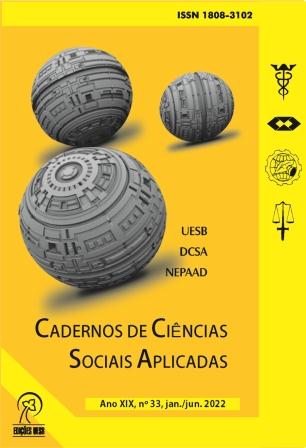The social rights in Brazil and the 1934 and 1988 constitutions: the memory update
DOI:
https://doi.org/10.22481/ccsa.v19i33.10617Keywords:
social rights in Brazil, delay in effectiveness, discursive interpretation and immediate applicability.Abstract
This work aimed to update the memory of social rights in Brazil from the comparative analysis between the provisions of the Brazilian constitutions of 1934 and 1988. The motivation to choose the theme is related to the importance of remembering the historical path of social rights in order to avoid the oblivion of the social contexts in which these were achieved on the formal plan. In section 1, a brief introduction was made, indicating the choice of the analytical method in which the theme of memory would be addressed based on the theory of memory places by Nora (1993 [1984]) and historical memory by Sá (2007). In section 2, the notion of historical memory was presented and the historical path of social rights was briefly traced, demonstrating that this was entirely marked by important social and political struggles of the working classes and their allies. In section 3, based on the aforementioned theoretical bases, it was sustained that the Constitution is embodied as a memory place of social rights, once in the interpretive practice of its provisions these are updated and have their paths remembered. In section 4, a comparison was made between the legal-constitutional disciplines of social rights established in 1934 and in 1988, in which an attempt was made to rescue the discursive memory of the interpretation of the rules that established these rights. Finally, the conclusion was presented, in the sense that the social rights provided for in the Constitution are immediately enforceable in view of paragraph 1 of article 5 of the 1988 Constitution, which granted immediate applicability to constitutional norms guaranteeing fundamental rights; that social rights continue to be denied to a large part of the population since 1934, when they were constitutionally guaranteed by the first and that the repeated denial of effectiveness of social rights is due, on the one hand, to government policies, more concerned with fiscal efficiency than with the basic needs and dignity of socially and economically vulnerable people, and on the other hand, to the greed of the private sector that captures social rights turning them into merchandise, especially the right to education, health and safety.
Downloads
References
ALEXY, Robert. Teoria dos Direitos Fundamentais. Tradução de Virgílio Afonso da Silva. São Paulo: Malheiros, 2008.
BOBBIO, Norberto. L’Etá dei Diritti. 3. ed. Torino: Einaudi, 1997.
BRASIL. Constituição Política do Império do Brasil de 24.03.1824. Rio de Janeiro, 22 de abril de 1824.
BRASIL. Constituição da República dos Estados Unidos do Brasil de 16.07.1934. Rio de Janeiro, 16 de julho de 1934.
BRASIL. Constituição da República Federativa do Brasil de 05.10.1988. Brasília, 5 de outubro de 1988.
FONSECA-SILVA, Maria da Conceição. Mídia e Lugares de Memória Discursiva. In: FONSECA-SILVA, Maria da Conceição; POSSENTI, Sírio. (Org.). Mídia e Rede de Memória. Vitória da Conquista: Edições Uesb, 2007, p. 11-37.
HERRERA, Carlos Miguel. Estado, Constituição e direitos sociais. Revista da Faculdade de Direito da Universidade de São Paulo. São Paulo, v. 102 p. 371 - 395 jan./dez. 2007. Disponível em: https://www.revistas.usp.br/rfdusp/article/view/67760/70368. Acesso em: 20 out. 2021.
LEAL, Rogério Gesta. Direitos humanos no Brasil: desafios à democracia. Porto Alegre: Livraria do Advogado, 1997.
NASCIMENTO, Marilza Ferreira do. Memória e História: a constitucionalização dos direitos sociais no Brasil. Vitória da Conquista: Edições Uesb, 2013.
NORA, P. Entre a memória e a história: a problemática dos lugares. Trad. Yara Aun Khoury. São Paulo: Projeto História, nº 10, p. 7-28, dez. 1993. Edição original: 1984.
QUEIROZ, Cristina. Direitos fundamentais sociais: questões interpretativas e limites de justicialidade. In: SILVA, Virgilio Afonso da (Org.). Interpretação constitucional. São Paulo: Malheiros, 2005. p. 165-216.
SÁ, Celso Pereira de. Sobre o Campo de Estudo da Memória Social: Uma Perspectiva Psicossocial. Rio de Janeiro, 2007. Disponível em: www.scielo.br/prc. Acesso em: 26 out. 2021.
SARLET, Ingo Wolfgang et. al. Curso de Direito Constitucional. 3. ed. São Paulo: Revista dos Tribunais, 2014.
SARLET, Ingo Wolfgang. A eficácia dos direitos fundamentais. Porto Alegre: Livraria do Advogado, 2007.
SCHNEIDER, Hans Pete. Carattere e Funzione dei Diritti Fondamentali nello Stato Costituzionale Democratico. Diritto e Società, Nuova Serie, n. 2, 1979.
SILVA, José Afonso da. Curso de direito constitucional positivo. 19. ed. São Paulo: Malheiros Editores, 2000.
SILVA, José Afonso da. Aplicabilidade das Normas Constitucionais. 2. ed. São Paulo: Malheiros Editores, 1982. Edição original: 1967.
Downloads
Published
How to Cite
Issue
Section
License
Copyright (c) 2022 Cadernos de Ciências Sociais Aplicadas

This work is licensed under a Creative Commons Attribution-NonCommercial 4.0 International License.






